Georgia’s moment of truth: Protesters demand Western path not Russian past
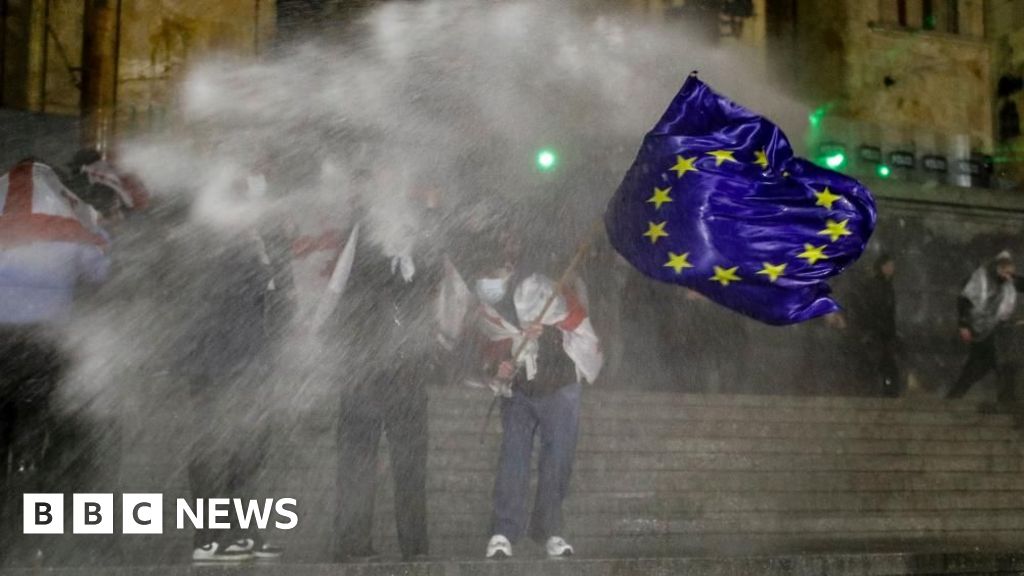
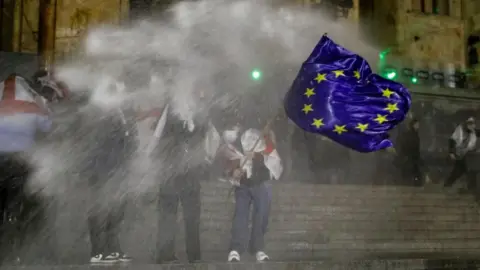 EPA-EFE/REX/Shutterstock
EPA-EFE/REX/ShutterstockNight after night, Georgians have filled the broad central avenue that runs past parliament, in such great numbers there is barely space to move, on the road or the pavement either side.
They come to Rustaveli Avenue draped in flags, the blue and gold of the EU and the red and white of the George Cross, and accuse their increasingly authoritarian government of ditching their European future for a return to the sphere of their Russian neighbour.
The ruling party, Georgian Dream, fervently denies any link to the Kremlin, but its actions in recent days have raised big questions about this country’s future with the West.
Not only has the party presided over a bitter fallout with the EU, it has just seen the US suspend Georgia’s hard-won strategic partnership too.
In a country of only 3.7 million people, these are dangerous as well as momentous times. One Georgian Dream supporter spoke of his country sitting at the edge of an abyss.
Through the night, whistles and the honk of vuvuzelas are occasionally punctuated by the crackle of protesters’ fireworks aimed at the imposing parliament building and the riot police standing guard with water cannon and tear gas.
For the first four nights, police waited until towards dawn before moving in to reclaim the street by force. But on Monday night they advanced far earlier, pushing protesters elsewhere.
Police have counted more than 100 injuries among their own force, while protesters in detention have endured beatings and serious facial and head injuries, according to lawyers, and dozens of TV reporters have come under attack.
“The scale of people being hunted down and beaten individually, so they have to be treated in clinics, has never been seen before here,” says Lasha Dzebisashvili, professor of politics at the University of Georgia.
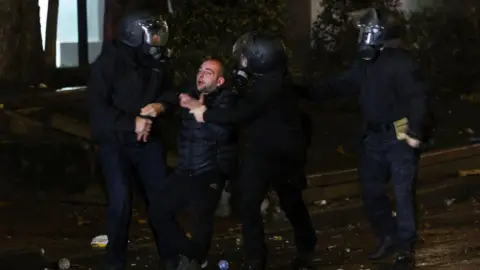 Getty Images
Getty ImagesGeorgia’s public rights defender, Levan Ioseliani, says police have engaged in “brutality” and abused their authority with impunity. Government supporters argue police have come under intolerable attack from stones and fireworks.
It is a constitutional crisis with no obvious way out, unless one side blinks first. Will the government back down, or the protests fizzle out under pressure from police?
“No negotiations,” says Prime Minister Irakli Kobakhidze, claiming without foundation that the protests are funded from abroad.
One couple say they will turn out every night in December until Georgian Dream changes tack and calls fresh elections, to erase a vote just over a month ago marred by a string of violations ranging from bribery to multiple voting.
Both sides accuse the other of lacking legitimacy.
The protesters, spurred on by a figurehead pro-Western president and four opposition groups, say the government is illegitimate; the opposition won’t enter parliament because of the “falsified elections”.
The ruling party, Georgian Dream, says it won the vote fair and square and insists it’s the largely ceremonial president, Salome Zourabichvili, who has no legitimacy. Her time in office is almost up, so why is it she is the one who plans to stay on to maintain stability, it asks.
All the while neighbouring Russia trains a close eye, comparing events to Ukraine’s “Maidan”, when its unpopular president was ousted by pro-EU protesters in February 2014 and Russian troops and their proxies moved in to seize parts of the country.
“We’re losing our country,” says Nika Gvaramia, an opposition leader from the alliance Coalition for Change, and Georgians are facing a stark choice between either a European Georgia or Russia.
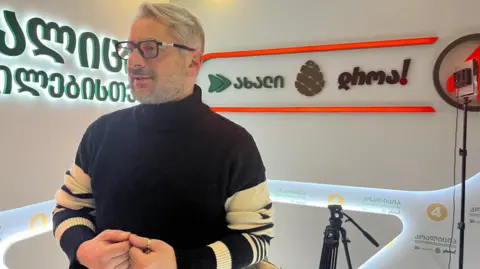
As he speaks, the protests are in full swing around the corner from his party HQ, and colleagues point to a CCTV video from inside their lobby a few days ago, showing a protester being beaten by police.
“We’re shaking this government. The rallies will go on for as long as needed. We have no other option. It’s a liberation fight. We know who we’re fighting with, and that’s Russia.”
The words “No to Russia” were daubed in big black graffiti on the front of the parliament building over the weekend and you can find the same kind of message on walls all over Tbilisi in varying degrees of bluntness.
It is also a message that carries different meanings here.
Georgian Dream’s highly controversial laws targeting civil society and LGBT groups this year have been branded Russian-style as well as anti-democratic.
The president has spoken of Georgian Dream’s election win as a Russian special operation, and there was an outcry afterwards when it emerged that a Russian called Alexander Malkevich who had set up a propaganda network in occupied eastern Ukraine had been given accreditation to cover the vote.
But none of that proves Russian interference, even if the billionaire driving force behind the party, Bidzina Ivanishvili, made his money in banking and steel in Russia, and critics believe he must still have contacts there.
A high-ranking Georgian Dream figure told the BBC back in October that Georgia had said no to Moscow a long time ago and that the “Russia card” was being used by the opposition to attack her party.
“Knowing a little bit of Georgian history… no government would be that stupid to start thinking about that,” said Maka Bochorishvili. Russia did fight a war with Georgia only 16 years ago.
She has since become Georgia’s foreign minister, the new face of this country’s diplomacy.
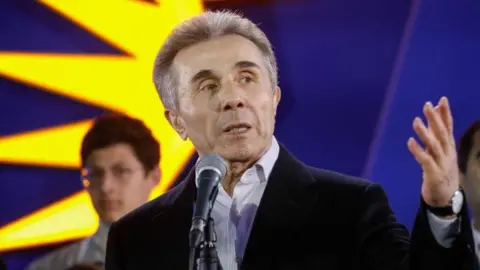 EPA-EFE/REX/Shutterstock
EPA-EFE/REX/ShutterstockThe crunch moment for Georgia and its relationship with the West came last Thursday, when the prime minister declared that the government had “decided not to put the issue of opening negotiations with the European Union” on the agenda for the next four years.
Within hours, Russia’s Vladimir Putin had seized on his comments.
“I admired their courage and character, which they showed when defending their point of view,” he said, stressing that Russia had no direct relationship with Tbilisi.
Kobakhidze has even used the same kind of language as the Kremlin, accusing the opposition of planning a Ukraine-style “Maidan” revolution.
However, his point was that Georgian police would ensure it did not happen.
Thomas de Waal, a Caucasus specialist at Carnegie Europe, believes it’s a mistake to see any kind of close friendship with Russia.
“It’s a business relationship – there’s no diplomatic relationship. Things are going on behind the scenes but they’re more afraid of Russia than wanting to join Russia.”
Whatever the extent of contacts, Moscow is bound to prefer Georgian Dream, who have within a short period trashed Georgia’s links with the EU and US, to a passionately pro-Western opposition.
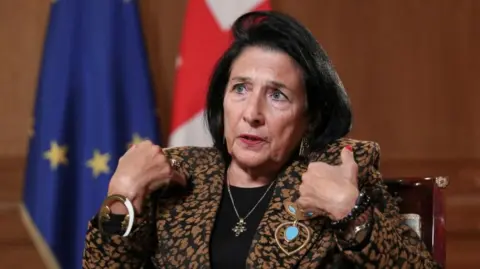 Reuters
ReutersThe nightly protests show no sign yet of abating, despite temperatures falling close to freezing, and there is no indication yet of a resolution.
Georgia has seen protests before, but not like this, says Lasha Dzebisashvili. Public servants from all walks of life have signed letters and petitions, and several ambassadors have resigned, including Georgia’s ambassador to the US, a clear blow for the ruling party.
The long stretch of Rustaveli Avenue is where this story will play out in front of parliament in Tbilisi, but the protests are being felt in other towns and cities too, including Batumi and Poti on the Black Sea, Zugdidi in the north-west and Kutaisi.
On Sunday night, a large crowd of protesters formed outside the public broadcaster, demanding that the president be given airtime rather than the usual pro-government fare.
It didn’t happen and gradually the protesters marched towards the centre of the capital, halting the traffic and chanting “Georgia, Georgia”.
Nika Gvaramia and his fellow opposition leaders believe the clear way out is for free and fair elections, not under the existing election commission but under the auspices of the EU and US: “If Georgian Dream is sure they won the elections, let’s go with new ones.”
That seems highly unlikely as it would require an implicit admission that the original vote was unfair.
GD supporter and university lecturer Levan Gigineishvili believes they just need to hold out for a new president in the US: “I think a great way out of this will be [Donald] Trump coming to power and then everything will change.”
But 20 January is a long way ahead and this small state in the Caucasus will not be top of his agenda. And Georgia’s business sector for one will not be happy with a continuing stalemate or with the government doing lasting damage to ties with the West.
World News || Latest News || U.S. News
Source link




